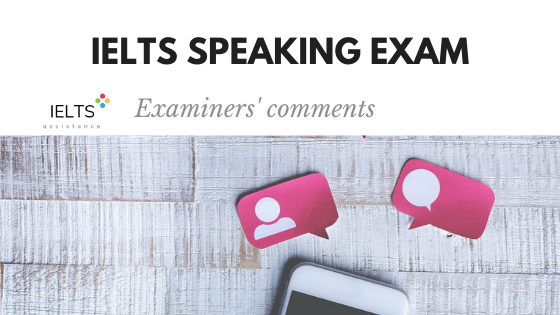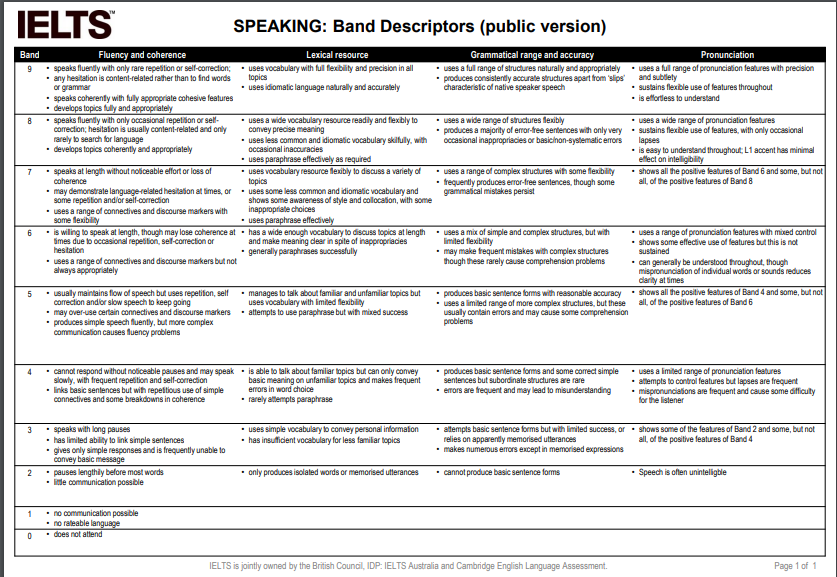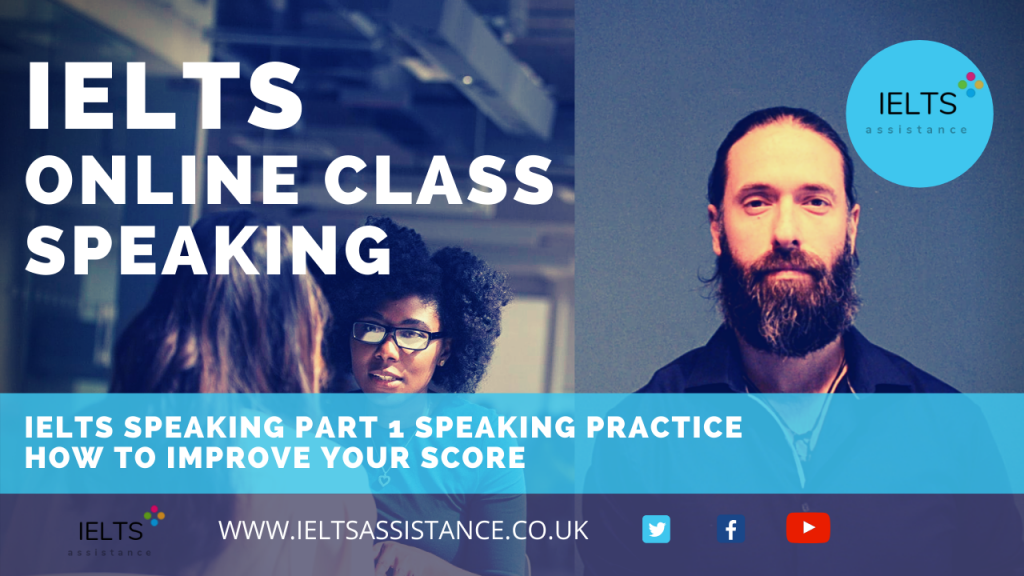IELTS Speaking Exam
Examples with examiners' comments

To give you an idea of the speaking exam it’s always good to have look at how other people do it. In the next section there are some videos from people doing parts of the IELTS speaking test. What you need to do is have a look at the videos along with the band descriptors for the speaking test and try to guess how well or not so well they did for the exam. The easiest way is to print out the band descriptors and use them when looking at the video. You can also just open the band descriptors and not watch video but just listen to the sound.
Task
Have a look at the video along with the band descriptors and decide how well she has done the exam.
Fluency and coherence
This test taker is able to keep going and is willing to give long answers, but coherence is occasionally lost through hesitation while she searches for words and ideas. She uses a good range of connecting words and markers (actually; in this way; I think the most important reason; as an example; as we know).
Lexical resources
Vocabulary is the strongest feature of her performance. She is able to discuss topics at length and demonstrates some awareness of style and collocation (contemporary society; casual activities; temporarily forget; a moment just for yourself; time and resources).
Grammatical range and accuracy
While she does make errors, these do not interfere with communication (for your healthy). Her grammatical control is less strong, although she does produce some complex structures, such as subordinate clauses, accurately. Her control of verb tenses is variable and she has recurring difficulty with subject/verb agreement (you shouldn’t to be too addict; they’re too focusing on; he need to). Despite these errors, her meaning is usually clear.
Pronunciation
She uses a range of pronunciation features but with variable control. Her rhythm is at times affected by syllable-timing but stress and intonation are used to some good effect (our life is not just for working – we should enjoy our lives as well). Some individual words and sounds are mispronounced, particularly ‘th’, but this has no significant impact on intelligibility and she can generally be understood without effort.
Overall band score
This test taker’s vocabulary is a slightly stronger feature but this is not enough to lift her score above Band 5.
Task
Have a look at the video along with the band descriptors and decide how well he has done the exam.
Fluency and coherence
This test taker can speak at length without noticeable effort or loss of coherence. He does, however, demonstrate some language-related hesitation, repetition and self correction. He develops topics appropriately, using a range of markers and linking words to give cohesion (lately; in my opinion; if I’m not wrong; maybe you know; actually).
Lexical resources
He has a good vocabulary and shows some awareness of style and collocation (working for peace; internal problem; people in need; in conflict; a border city) but he sometimes makes the wrong word choices (if I do something very queer; to be in-between everyone).
Grammatical range and accuracy
He has good grammatical control and produces many error-free sentences, using both simple and complex structures (more easily than before; without being treated differently). However, there are some problems with tenses (they bring instead of ‘they brought’; if I will like to read; I can be famous instead of ‘I could be famous’; I prefer my privacy instead of ‘I would prefer my privacy’), with articles (they don’t have private life) and with word order (even you can upload).
Pronunciation
There are many examples of very natural pronunciation and he can be easily followed, as he uses intonation and stress to good communicative effect. There are just a few problems with the production of individual sounds but, overall, his accent is slight and has very little impact on intelligibility.
Overall band score
This test taker is a clear example of a Band 7.
Task
Have a look at the video along with the band descriptors and decide how well he has done the exam.
Fluency and coherence
This test taker is willing to give extended responses but there is occasional loss of coherence as a result of hesitation and repetition. He tends to overuse certain fillers (well; like; ‘cos; yeah), although he draws on a reasonable range of linking words (for example; actually; as a result).
Lexical resources
His range of vocabulary is sufficient to discuss topics at length and he displays some ability to use less common items and collocation (get on very well with each other; increase money for the charity; good for the community; developed country; psychologically; physically). Even when he makes wrong word choices, his meaning is clear and he can convey his ideas and opinions quite effectively (fast speed work; relieve themselves after work; release their body pressures).
Grammatical range and accuracy
He does not always demonstrate awareness of register or style and he tends to use the rather too informal gonn’ and wanna. He can produce a range of structures and a mix of simple and complex sentence forms. Grammatical constructions are also used well to introduce his ideas (by having a hobby; by doing sports). Grammatical control of more complex structures is variable (they just want to get big car big house and that’s the reason that forces them to work very hard than before), but errors rarely cause comprehension problems.
Pronunciation
His pronunciation is generally clear and there is some use of stress and intonation to convey meaning, although on the whole his intonation is somewhat flat. His speech is often syllable-timed and this leads to a rather mechanical rhythm.Certain words are sometimes mispronounced, resulting in an occasional loss of clarity (wail for ‘while’; lerer for ‘leisure’; louts for ‘lots’). Overall, he can be understood without much effort.
Overall band score
This test taker is willing to speak at length, but he does not display the features of performance necessary to lift his score above Band 6.
Task
Have a look at the video along with the band descriptors and decide how well she has done the exam.
Fluency and coherence
This test taker speaks fluently and is able to give quite long and detailed responses without any loss of coherence. Hesitation is usually content-related and only occasionally to search for language. She uses fillers (you know; I mean) to cover this. Linking words and markers are used very naturally (that’s not the case; I’m fine with that).
Lexical resources
Her vocabulary resource is wide and it allows her to talk about a range of topics with some flexibility and precision. There are plenty of examples of stylistically appropriate language (political pressure; into corruption; today’s world; offensive; promote the product; a money-making business) with only occasional inaccuracies (do a meeting; in a right/wrong manner).
Grammatical range and accuracy
She uses a wide range of structures with a high level of accuracy. She makes only occasional minor errors.
Pronunciation
She uses pronunciation well to reinforce meaning, with rhythm, stress and intonation all used appropriately (at times I do like). There are only occasional lapses in word stress and in the formation of ‘th’.
Overall band score
This test taker is an example of a Band 8.
Task
Have a look at the video along with the band descriptors and decide how well he has done the exam.
Fluency and coherence
This test taker is unable to keep going without noticeable pauses as he searches for language. His speech is slow with frequent repetition and self-correction and there are some breakdowns in coherence. He links some ideas but can only use simple connecting words (so; because).
Lexical resources
Vocabulary is this test taker’s strongest feature and allows him to talk about topics familiar to him. However, it is sufficient for only limited discussion of unfamiliar topics (balance; relax; salary; ability; free time for chatting; rely on drinking – it’s not good for society or people’s health). Some ideas are repeated (good for their health).
Grammatical range and accuracy
His grammatical control is weak. Some simple sentence forms are produced fairly accurately (has more ability to meet others; may be more developed) and he sometimes attempts more complex forms. Subordinate clauses, however, are rare, turns are short and errors frequent.
Pronunciation
He uses a very limited range of pronunciation features. His problems with hesitations and false starts have a serious impact on his ability to produce connected speech and there is little evidence of control of stress and intonation. However, it is his production of individual sounds which causes greatest strain to the listener. Final consonants are often not pronounced (becau(se); balan(ce); li(ke); heal(th)), and some are incomprehensible without context (wishen for ‘question’). Understanding requires considerable effort and there are patches of speech that cannot be understood.
Overall band score
This test taker’s vocabulary is stronger than other features of his performance, but his pronunciation is poor, restricting his rating to a Band 3.5.
Writing Task 2 Essay Model Examples
General Writing Task 1 Model Examples
Task
Have a look at the video along with the band descriptors and decide how well he has done the exam.
Fluency and coherence
This test taker speaks fluently and he engages with the questions without any obvious effort. There is only occasional hesitation, repetition and self-correction, which is mostly content-related and only rarely to search for language. His relaxed delivery is supported by his flexible use of markers (I am both; basically; as well as; every now and then; that would be French).
Lexical resources
His vocabulary is sufficient for him to engage with a variety of topics and he demonstrates an ability to use idioms and collocations with some sense of style and skill. However, he makes a number of inappropriate vocabulary choices (all over the place; that’s not just my cup of tea; someone to confront and talk to; I haven’t got a chance), which restrict his rating on this criterion.
Grammatical range and accuracy
He has a wide range of grammatical structures at his disposal and the majority of sentences are error-free. Even when errors do very occasionally occur (I work part-time as well as a student; it just does not come into me), they do not detract at all from meaning.
Pronunciation
He uses a wide range of pronunciation features and is able to use stress and intonation effectively. There are just a few lapses and very occasionally sounds are poorly formed (bot for ‘both’; vent for ‘went’), but overall, his accent has only minimal effect on intelligibility.
Overall band score
The test taker’s vocabulary is not as strong as other features of his performance and restricts his rating to Band 7.5
Task
Have a look at the video along with the band descriptors and decide how well he has done the exam.
Fluency and coherence
This test taker speaks fluently for most of the time and develops topics coherently and appropriately, with only slight content-related hesitations as he engages with the topics.
Lexical resources
His vocabulary is precise and sophisticated throughout this part of the test (prominent businessmen; emulate; a growing number of television celebrities; to promote charitable causes; endorsing a cause; negative repercussions; conscious of body image; susceptible to; prevalent).
Grammatical range and accuracy
He uses a wide range of grammatical structures naturally and accurately, with no noticeable error.
Pronunciation
He also uses a full range of pronunciation features to convey precise and subtle meaning such as emphatic stress (one example that comes to mind is celebrities) and contrastive stress (it’s not necessarily for causes … it’s also for celebrity behaviours). He sustains this flexible use of features of connected speech throughout and is effortless to understand.
Overall band score
Only this test taker’s occasional hesitations prevent him reaching Band 9.
Task
Have a look at the video along with the band descriptors and decide how well he has done the exam.
Fluency and coherence
This test taker is willing to speak at length but his speech is not always coherent. He uses a variety of linking words and markers (it’s possible that; while; especially;) but maybe is overused.
Lexical resources
He uses a range of vocabulary, including a few less common items, with some awareness of collocation (internet website; a specific group; local society; easy come, easy go). His meaning is usually clear despite some inappropriate vocabulary use (they are interesting about; the another people) and he is able to paraphrase (touch the feeling of the people).
Grammatical range and accuracy
Grammar is his weakest feature. Basic sentence forms are fairly well controlled for accuracy and he produces some complex structures, but errors in areas such as articles, pronouns and verb tenses are frequent and sometimes impede communication (people whose they can; know them since when we were a child; everybody will forgot them; read it only which is enjoyable to them).
Pronunciation
He uses a range of pronunciation features. He uses pausing quite effectively to break up the flow of speech into word groups and there are some good examples of the use of intonation and both emphatic and contrastive stress (sports stars or maybe movie stars; the young ones; create or produce). However, there are a few problems with syllable stress (colleagues; interesting), and some sounds are poorly formed, with a redundant ‘s’ added to the end of some words (buts; in the futures). Generally, he can be understood without much effort.
Overall band score
This test taker’s weakness in grammar restricts his score to Band 5.5
Task
Have a look at the video along with the band descriptors and decide how well she has done the exam.
Fluency and coherence
This test taker speaks fluently, with only rare repetition or self-correction. Any hesitation is not to search for language but to think of ideas. Her speech is coherent, with fully appropriate cohesive features (if you’re talking about; other than that; I think it’s more; as you can see).
Lexical resources
She uses vocabulary with full flexibility and precision in all topics with a wide range of idiomatic language (have a tendency; be exposed to; the world is becoming more globalised; the norm; strikes a chord; communication tool; actors that sponsor; materialistically; cool gadgets; grasp of people’s mindset)
Grammatical range and accuracy
Her grammatical structures are precise and accurate at all times. She uses a full and natural range of structures and sentence types and makes no noticeable errors.
Pronunciation
She uses a full range of phonological features with precision and subtlety. The rhythm of her language is sustained throughout and stress and intonation are invariably used to good effect. This and her very clear production of individual words and sounds result in her being effortless to understand.
Overall band score
This performance was given a Band 9
Writing Task 2 Essay Model Examples
General Writing Task 1 Model Examples
Get your writing and speaking corrected
Join the ever growing group of students who we helped on the road to success and get the professional help you have been looking for.
Useful links
Speaking correction
Record your speaking and let a teacher correct and give feedback on your speaking.
Speaking examples
Have a look at some videos of people doing different parts of the IELTS exam and the comments and band score the IELTS examiner gives for them.
Speaking Part 1
Have a look at Part 1 of the Speaking exam
Speaking Part 1 topics
Have a look at the different topics and questions asked during Speaking Part 1 and prepare your self for the test.
Speaking Part 2
Have a look at Part 2 of the Speaking exam.
Speaking Part 2 topics
Have a look at the different topics and questions asked during Speaking Part 2 and prepare your self for the test.
Speaking Part 3
Have a look at Part 3 of the Speaking exam
Speaking Part 3 topics
Have a look at the different topics and questions asked during Speaking Part 2 and prepare your self for the test.


6 Responses
Thank you very much for your efforts. I am an IELTS Trainer. I am greatly benefited from your blog. I use many resources from your blog during teaching. Please keep up the best work!!
Hello Rajib,
Thank you very much. I am very happy to hear this. I hope to keep on helping you in the future
Nice website for IELTS learners. There is wide variety of information available about IELTS here.
Hello Gill,
Thanks for the comment I am very happy you like it. And yes I try to give a lot of information to my students.
Thanks again and enjoy,
That is a great tip especially to those fresh
to the blogosphere. Brief but very accurate info… Many thanks for sharing this one.
A must read article!
Thanks